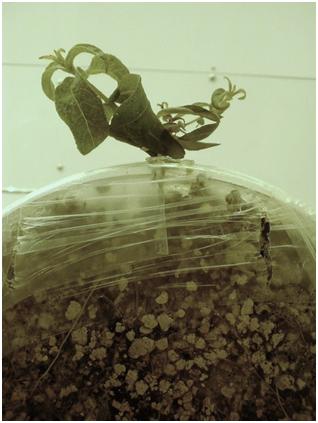Doctor Kerry Keniry
Candidature
 Graduated PhD 2016
Graduated PhD 2016
Thesis Title
Climate change impacts on ectomycorrhizal fungi associated with Australian eucalypts
Research Project
The surface temperature of Australia has increased by 1°C since 1990 and is projected to continue to increase by a further 2-3°C by 2050. In addition, the atmospheric concentration of carbon dioxide (CO2) has risen from 280 ppm in 1750 to 385 ppm in 2009, and is projected to increase to 465 ppm in 2050. These changes to climatic conditions have had, and will continue to have, an effect on forest ecosystems.
This project aims to determine the effects of climate change on ectomycorrhizal fungi (which form symbiotic associations with Australian eucalypts) using manipulative laboratory based experimentation. The project will be conducted using fungal isolates in axenic culture as well as growing in symbiosis with eucalypt seedlings in laboratory microcosms.
This research will require a fungal isolate collection which will be established by collecting fruiting bodies of ectomycorrhizal fungi growing in association with eucalypts and isolating them into axenic culture in the laboratory. All isolates will be identified using morphological characteristics and molecular analysis of fungal internal transcribed spacer (ITS) sequences. In subsequent experiments, individual species of ectomycorrhizal fungi will be grown in media containing varying ratios of carbon and nitrogen in order to determine the response of individual species to increasing carbon supply.
This mimics the likely scenario of increased carbon supply to ectomycorrhizal fungi under future elevated atmospheric CO2 conditions. Similarly, interspecific responses to the varying growth media will be examined between mixtures of ectomycorrhizal fungi. This will determine the effect on competition between individual fungal species.
Microcosms containing single eucalypt seedlings (germinated under sterile conditions) will be established and inoculated either with individual species of ectomycorrhizal fungi or with species mixtures in order to determine differences in fungal responses when in isolation and when in competition with other species. The microcosms will be grown under different atmospheric CO2 and temperature conditions in controlled environment growth rooms at HIE.
Analyses will include the measurement of carbon utilization, biomass production, respiration and chemical analysis of the growth medium and phospholipid fatty acid (PFLA) analysis along with the analyses of nutrient and plant material.
Research Images
 The
role of an Australian ectomycorrhizal symbiosis in carbon capture - now and in the future.
The
role of an Australian ectomycorrhizal symbiosis in carbon capture - now and in the future.
Eucalyptus globulus seedling colonised by Pisolithus microcarpus, transplanted into a sterile microcosm and grown in climate cabinet, age 3 months.
Research Project Supervisors
Professor Ian Anderson, Dr Barbara Drigo and Dr Jonathan Plett
Selected Publications
Plett JM, Kohler A, Khachane A, Keniry K, Plett KL, Martin F, Anderson IC, (2015) 'The effect of elevated carbon dioxide on the interaction between Eucalyptus grandis and diverse isolates of Pisolithus sp. is associated with a complex shift in the root transcriptome', New Phytologist, vol.206, no.4, pp 1423-1436
Anderson IC, Drigo B, Keniry K, Ghannoum O, Chambers SM, Tissue DT, Cairney JW, (2013) 'Interactive effects of preindustrial, current and future atmospheric CO2 concentrations and temperature on soil fungi associated with two Eucalyptus species', FEMS Microbiology Ecology, vol.83, no.2, pp 425-437
View the Thesis
» Australasian Digital Theses Online (opens in a new window)